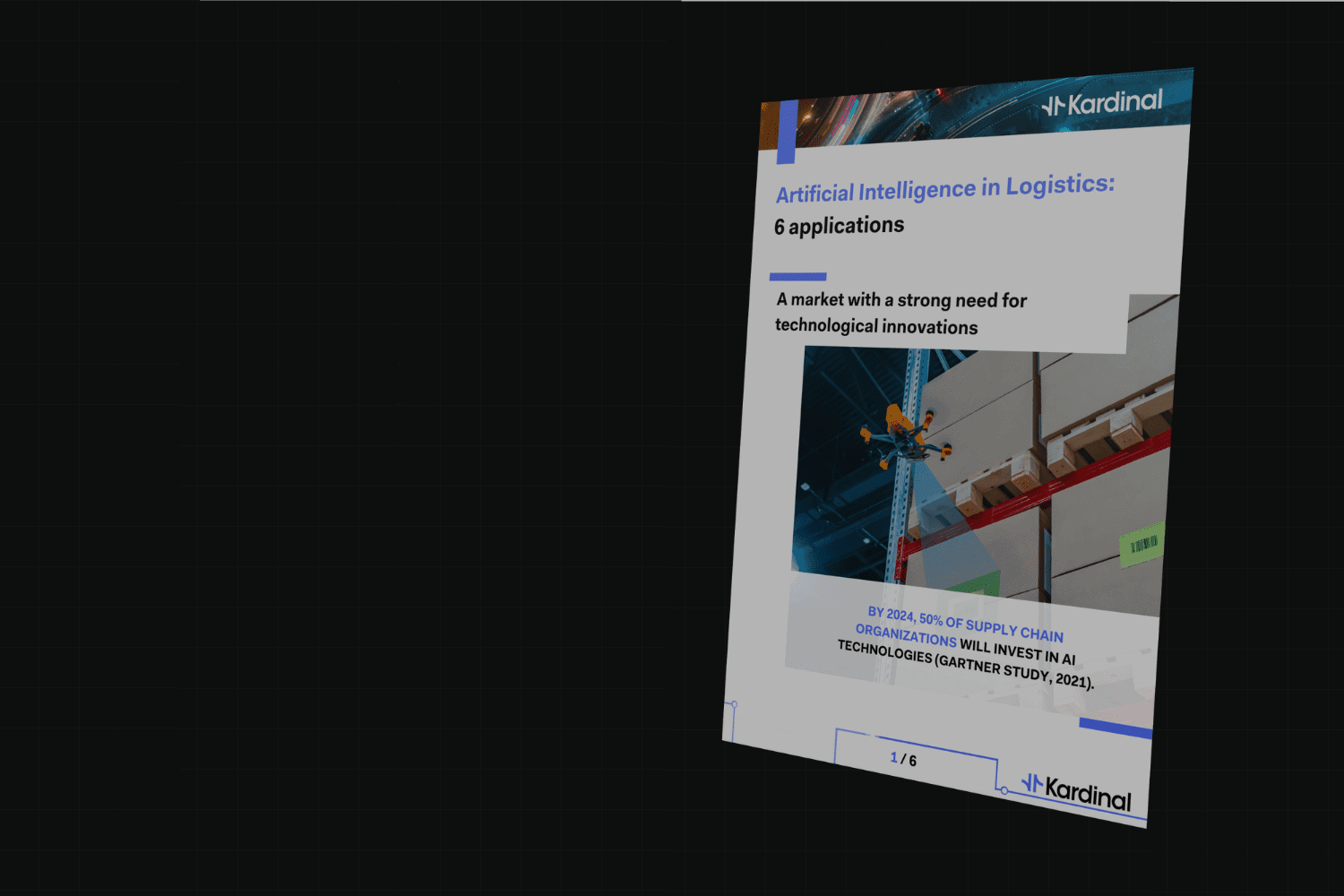[REPORT]
Artificial Intelligence in Logistics: 6 applications
Generative Artificial Intelligence (Generative AI or GenAI) has experienced rapid growth in recent months with the advent of public tools like ChatGPT, Perplexity, Claude or Gemini. Developed by OpenAI, ChatGPT quickly became the fastest-growing application in history, reaching 100 million users in just two months. Its resounding success has democratized Generative AI for the general public.
In this article, discover what Generative AI is, its benefits, challenges, and how it surpasses traditional AI, particularly in the logistics industry.
Harnessing the Potential of Artificial Intelligence for an Efficient Supply Chain
Artificial intelligence encompasses a range of technologies designed to replicate and enhance human cognitive abilities through algorithms and mathematical models. AI analyzes vast amounts of structured and unstructured data to detect patterns, correlations, and insights that are often beyond human analysis. It primarily utilizes machine learning and deep learning techniques to continually improve its performance. This enables AI to recognize images, sounds, texts, translate between languages, generate content, detect anomalies, and optimize complex processes.
In the logistics industry, AI offers multiple advantages by automating repetitive low-value tasks and optimizing high-value complex processes.
Automation of Repetitive Tasks
AI efficiently automates tedious and time-consuming logistical tasks such as sorting, shelving, and inventory management. Using computer vision systems, voice recognition, or robotics, these operations can be performed quickly, accurately, and continuously, thereby reducing operational costs.
Optimization of Complex Processes
For high-value tasks such as production planning, supply management, or route optimization, AI becomes a powerful decision-support tool. By analyzing vast amounts of data and performing complex calculations, it can provide informed recommendations to support human decision-making.
From inventory automation to route optimization, order preparation, transportation visibility, and predictive risk management, AI offers numerous use cases that enhance the efficiency, productivity, and resilience of the entire supply chain.
For example, AI efficiently automates order preparation in warehouses. AI-guided robots autonomously move to collect items and deliver them to operators. The AI optimizes their paths by analyzing ongoing orders to determine the most efficient flows. This automation of picking offers numerous benefits:
– Increased productivity and preparation times
– Reduced operational costs related to picking
– Lower error rates in order preparation
– Improved working conditions for operators
Reaching a New Level of Logistics Optimization with Generative AI
In recent years, Generative Artificial Intelligence, commonly known as Generative AI or GenAI, has emerged as one of the most popular and innovative topics for logistics professionals. This vision of a logistics sector reinvented by Generative AI is widely embraced within the industry. According to a recent Gartner survey, nearly two-thirds of supply chain managers plan to adopt (50%) or are already implementing (14%) this promising technology, dedicating approximately 6% of their budgets to it.
GenAI: Capabilities Beyond Traditional AI
Generative AI is based on artificial neural networks known as deep learning models. These models are trained on vast amounts of real data (texts, images, etc.) to automatically extract underlying patterns, structures, and correlations.
With its ability to autonomously generate new and realistic content like images, texts, or models, Generative AI goes beyond traditional AI approaches limited to solving specific problems. Thanks to its advanced capabilities, GenAI can:
- Efficiently analyze and classify data, whether visual, numerical, or textual, to extract relevant information.
- Rapidly model and optimize strategies, operational plans, and resource allocations by leveraging real-time data.
- Automatically generate decision-making content in various formats (texts, images, models), allowing for quicker response times.
- Synthesize large volumes of complex data to identify key trends and insights.
- Accelerate the search for relevant information and provide instant responses, whether through voice or text.
Thus, GenAI enables agile and intelligent processing of massive data while automating the production of contextualized decision-making content. These capabilities allow for the end-to-end acceleration and optimization of supply chain processes, resulting in greater operational efficiency.
For example, Generative AI enables predictive risk management. By analyzing massive datasets (historical, market, weather, geopolitical, etc.), it proactively identifies and models potential risks.
Beyond this predictive analysis, GenAI generates detailed risk assessments, simulates various crisis scenarios, and recommends tailored strategies to mitigate impacts. This augmented intelligence helps planners implement adjusted emergency plans to strengthen operational resilience against disruptions.
💡 Discover our article on the use cases of Generative AI in logistics.
Overcoming the Challenges of Generative AI in the Supply Chain
Despite its revolutionary potential, deploying Generative AI in the supply chain raises significant challenges. Data security and privacy are paramount, requiring robust measures against unauthorized access and leaks.
Another risk lies in the algorithmic biases that can be induced by the training data of Generative AI models. These biases could perpetuate or amplify existing discriminations. It is crucial to identify and correct these biases to ensure the fairness of deployed systems. Additionally, the rise of Generative AI in logistics calls for a suitable regulatory framework to guide its use and ensure legal compliance of implemented solutions.
Multi-stakeholder initiatives are already underway to address these complex challenges in terms of security, ethics, transparency, and governance. A collaborative approach will be essential to fully leverage this promising technology.
Generative Artificial Intelligence presents a unique opportunity to profoundly transform logistics operations. With its advanced capabilities in analyzing massive data sets, predictive modeling, and automatically generating decision-making content, GenAI accelerates and optimizes the entire supply chain process. There is no doubt that this augmented intelligence will eventually become an indispensable strategic lever for logistics companies looking to stand out in an increasingly competitive and demanding environment.

